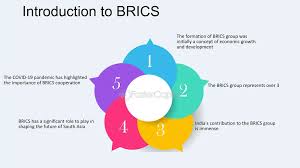Introduction
BRICS—comprising Brazil, Russia, India, China, and South Africa—is a significant international grouping representing emerging economies that play a pivotal role in shaping global economic and political dynamics. In recent years, BRICS has undergone a strategic expansion to include new members, enhancing its global influence. India, as one of the founding members, has played a crucial and proactive role in driving this expansion, reflecting its ambitions on the world stage.
Why BRICS Expansion Matters
- Global Influence: BRICS aims to create a multipolar world order, balancing Western dominance in global institutions like the IMF and World Bank.
- Economic Growth: Including new members boosts collective economic power and trade opportunities.
- Political Cooperation: Expansion allows for greater collaboration on global issues like climate change, security, and sustainable development.
India’s Strategic Role
1. Advocating for Inclusivity and Diversity
India has consistently championed a broader and more inclusive BRICS forum that reflects the diversity of the Global South. India pushed for inviting countries from Africa, Latin America, and Asia to make BRICS more representative and dynamic.
2. Diplomatic Engagements and Coalition Building
India actively engaged with potential new member countries through diplomatic visits, virtual summits, and bilateral meetings to build consensus around BRICS expansion.
3. Economic and Trade Initiatives
India leveraged BRICS as a platform to promote South-South cooperation, encouraging new members to participate in initiatives like the New Development Bank (NDB) which funds infrastructure and sustainable development projects.
4. Emphasis on Reforming Global Governance
India has used BRICS to press for reforms in global governance institutions, advocating for the inclusion of emerging economies in decision-making, making expansion a tool to strengthen this push.
Recent Developments
- In 2023 and 2024, BRICS formally invited several countries including Argentina, Egypt, Saudi Arabia, and the United Arab Emirates to join the group.
- India’s leadership helped smooth negotiations and address concerns related to geopolitics, economic interests, and institutional functioning.
- India also proposed frameworks to deepen cooperation between existing and new members across technology, energy, and health sectors.
Challenges and Outlook
While expansion enhances BRICS’ profile, challenges remain:
- Balancing the interests of diverse member states.
- Managing geopolitical tensions, especially with China.
- Ensuring effective decision-making with a larger group.
India’s diplomatic skill and strategic vision will be crucial in navigating these challenges.
Conclusion
India’s role in the BRICS expansion underscores its growing stature as a global power willing to lead collective efforts to reshape the international order. Through proactive diplomacy and economic cooperation, India aims to build a stronger, more inclusive BRICS that can better serve the interests of emerging economies worldwide.
































































